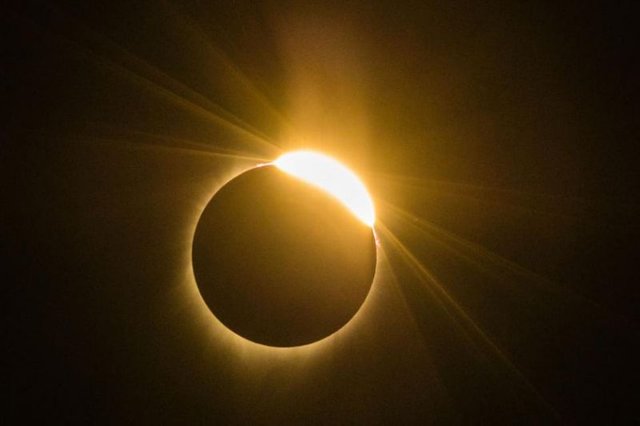Using rare ancient Egyptian carvings and passages from the Old Testament book of Joshua, academics have revealed the date of the earliest-ever recorded solar eclipse, establishing an exact chronology of when Pharaohs ruled.
By cross-referencing the two texts, academics from the United Kingdom's University of Cambridge have ascertained that the solar eclipse mentioned in the Bible occurred the afternoon of October 30, 1207 B.C.
The study, published in the astronomical journal Astronomy & Geophysics, explains how experts went back to the original Hebrew text of the Christian and Jewish holy book to shed light on a passage that had baffled scholars for centuries.
The verses in question concern the passage in which Joshua leads the Israelites into Canaan. "Sun, stand still at Gibeon, and moon, in the Valley of Aijalon. And the sun stood still, and the moon stopped," the text reads.

The total solar eclipse as seen in Madras, Oregon, on August 21. Experts have calculated that the oldest recorded eclipse occurred in 1207 B.C. ROB KERR/AFP/Getty Images
Don't miss: So If Police Body Cams Don’t Work, What’s the Solution?
The meaning had been lost in English renderings, but recent translations by Professor Sir Colin Humphreys suggest they reference an eclipse. “Going back to the original Hebrew text, we determined that an alternative meaning could be that the sun and moon just stopped doing what they normally do: They stopped shining. In this context, the Hebrew words could be referring to a solar eclipse,” Humphreys explained.
By reading the hieroglyphs carved in the granite Merneptah Stele, an Egyptian text dating from the reigns of Pharaoh Merneptah and his son Ramesses the Great, historians were able to date the Israelites' presence in Canaan to between 1500 B.C. and 1050 B.C.
The breakthrough in comparing the two texts was made by backdating not only total solar eclipses using astronomical patterns but also annual eclipses in which the sun does not completely cover the moon but creates a distinctive ring of fire. From the calculations, which took into account the fluctuations in Earth’s orbit and rotation, Humphreys and his team posited that the only annual eclipse that could have taken place while the Israelites were in Canaan occurred in 1207 B.C.
As such, the experts have been able to date the reigns of the ancient Egyptian Pharaohs for the very first time. In the past, the reigns of those rulers could only be placed within a range of a few centuries or so. The new calculations can put the date of the rule of Ramesses the Great to within a year of 1276–1210 B.C. His son Merneptah, by the same logic, would have started his reign in 1210 B.C. or 1209 B.C.
Hi! I am a robot. I just upvoted you! I found similar content that readers might be interested in:
https://www.yahoo.com/news/ancient-egyptian-biblical-texts-reveal-115744452.html
Downvoting a post can decrease pending rewards and make it less visible. Common reasons:
Submit